 Petzlover
Petzlover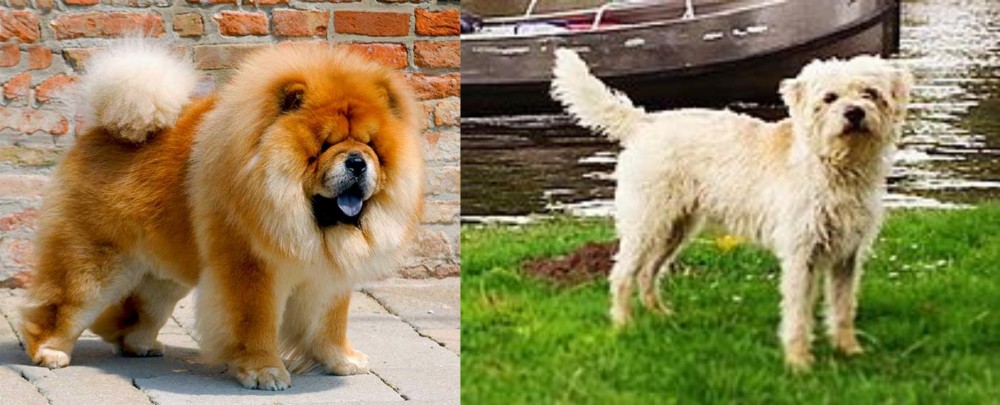 Chow Chow is originated from China but Dutch Smoushond is originated from Netherlands. Chow Chow may grow 8 cm / 4 inches higher than Dutch Smoushond. Chow Chow may weigh 21 kg / 47 pounds more than Dutch Smoushond. Both Chow Chow and Dutch Smoushond has almost same life span. Both Chow Chow and Dutch Smoushond has almost same litter size. Chow Chow requires High Maintenance. But Dutch Smoushond requires Moderate Maintenance
Chow Chow is originated from China but Dutch Smoushond is originated from Netherlands. Chow Chow may grow 8 cm / 4 inches higher than Dutch Smoushond. Chow Chow may weigh 21 kg / 47 pounds more than Dutch Smoushond. Both Chow Chow and Dutch Smoushond has almost same life span. Both Chow Chow and Dutch Smoushond has almost same litter size. Chow Chow requires High Maintenance. But Dutch Smoushond requires Moderate Maintenance
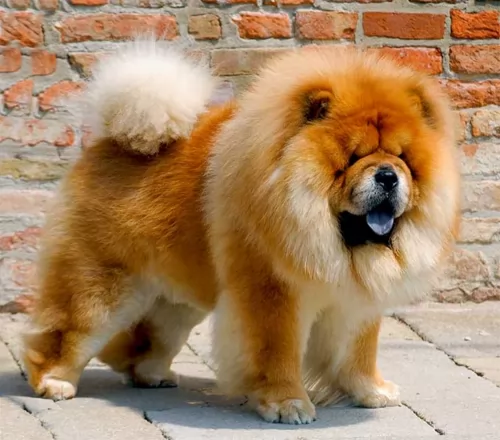 Northern China is the original home of the Chow Chow. In that region of China, the breed was known as the Songshi Quan – “the puffy-lion” dog. They have also been known in China as the “Dog of the Tang Empire” or the Tang Quan. The Chow is believed to be an ancient breed that the Foo Dog, or stone dog guardians of Buddhist palaces and temples, is modeled after. It is one of the most ancient of dog breeds that are still around today.
Northern China is the original home of the Chow Chow. In that region of China, the breed was known as the Songshi Quan – “the puffy-lion” dog. They have also been known in China as the “Dog of the Tang Empire” or the Tang Quan. The Chow is believed to be an ancient breed that the Foo Dog, or stone dog guardians of Buddhist palaces and temples, is modeled after. It is one of the most ancient of dog breeds that are still around today.
It is believed that they have existed for around 2000 years or perhaps even as far back as 3000 years, starting out in Mongolia and migrating to China. The ancientness of the Chow Chow has been validated through DNA testing. In China all those centuries ago, the Chow Chow was born to be a working dog. They hunted, herded, guarded and pulled carts. They went on quests with the Mongolian armies when China was invaded, as well as when the Mongolians invaded the Middle East and Europe later on.
Today’s Canadian Kennel Club has about 350 Chows registered while the AKC gets 10,000 new registrations every year.
 The Dutch Smoushond, known also as the Hollandse Smoushond ,Hollandse Herdershond
The Dutch Smoushond, known also as the Hollandse Smoushond ,Hollandse Herdershond
or Dutch Ratter is a small to medium sized dog. The Smoushondenclub was formed in 1905 as it was thought that the breed was dying out and they wanted to register the dog as a purebred breed.
It is believed that the dog’s origins may have to do with the Schnauzer breed. It was in 1973 that a number of breeders looked to reconstruct the breed, using Border Terrier crosses.
Today this rare breed is popular in the Netherlands, but not particularly well known anywhere else. In 2001 it was recognized by the Federation Cynologique Internationale as well as by the United Kennel Club in the United States.
Although the dog was once a skilled ratter, most Dutch Smoushond are kept as companion dogs.
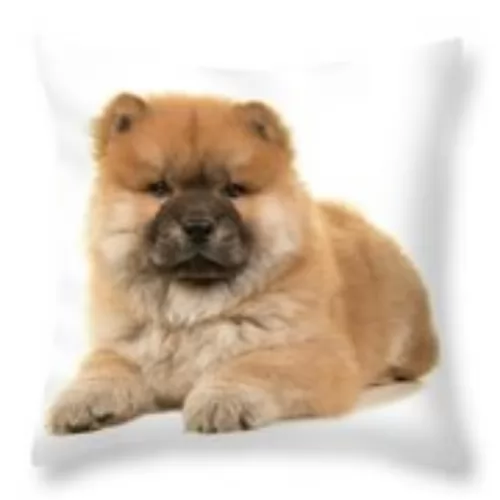 The Chow really does look like a small lion with a black tongue. The dog is sturdy and square with erect, small ears on a broad skull. They have a very dense double coat. Their eyes are deep set and look like almonds, while they all have that very distinctive purple or black tongue. Their lips are also distinctive with their blue color. The nose is black, but some Chows might have a blue nose. The tail is curly.
The Chow really does look like a small lion with a black tongue. The dog is sturdy and square with erect, small ears on a broad skull. They have a very dense double coat. Their eyes are deep set and look like almonds, while they all have that very distinctive purple or black tongue. Their lips are also distinctive with their blue color. The nose is black, but some Chows might have a blue nose. The tail is curly.
These are medium size dogs when it comes to height and weight, but they are powerfully built for their size. Their power is in their compact body holding the energy and strength of a much larger dog. Its hind legs are almost entirely straight, unusual for any dog. They get their lion appearance from the huge ruff that stands behind their heads. Their chest is broad and deep.
 The Dutch Smoushond is a small to medium sized dog breed related to the Schnauzer- and Pinscher breed. He stands at about 35 to 43cm at the withers and weighs about 10kg.
The Dutch Smoushond is a small to medium sized dog breed related to the Schnauzer- and Pinscher breed. He stands at about 35 to 43cm at the withers and weighs about 10kg.
He has a rough, shaggy, wiry coat which is waterproof and which is a yellowish or straw color. You’ll notice that the hair around the face is long and fairly straight and forms a beard, eyebrows, and moustache, giving him wise, know-it-all look.
The forelegs are also feathered. He may well give the impression of being ungroomed and untidy with his different length hair. He has floppy ears, the eyes are small and dark, the nose black and the tail is long and feathery, hanging limply when the dog is relaxed.
Easy going, friendly and social, the Dutch Smoushond is a fairly quiet dog, but because he is intelligent and alert, he makes a good watchdog.
When not guarding you, he is cheerful and entertaining. He is an adaptable dog, being able to settle down to life in the city or in the countryside, getting on well with other pets in the home as well as with children.
He is a dog who wants to please, so training him isn’t going to prove difficult. He’ll do well with this training as well as socialization as he becomes obedient, easy-going and relaxed around strangers.
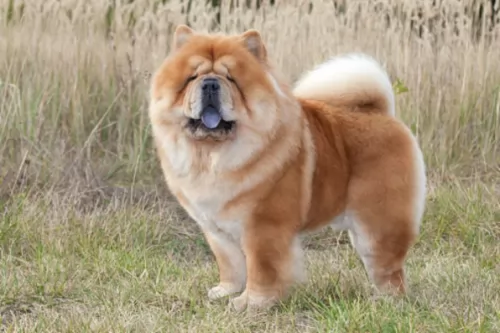 Loyal and true to their family and those they know; the Chow Chow is a little standoffish with strangers. They are very protective and usually attach themselves to one or two people. They are intelligent but stubborn, which can affect your training with them. They need to respect their people and Chows respect hose who take care of them. They can be aggressive toward dogs of their same sex especially if those dogs are the same breed as well.
Loyal and true to their family and those they know; the Chow Chow is a little standoffish with strangers. They are very protective and usually attach themselves to one or two people. They are intelligent but stubborn, which can affect your training with them. They need to respect their people and Chows respect hose who take care of them. They can be aggressive toward dogs of their same sex especially if those dogs are the same breed as well.
They are known to be very clean and many have compared them to cats in that regard. They appear to be dignified and refined. They are usually very quiet but very adaptable dogs.
 The Dutch Smoushond, also known as the Dutchie, Dutch Ratter or Dutch Terrier may once have been used as a vermin hunter, but today this terrier dog shares some of the characteristics of the more popular terriers. He may have been a hunter in his day, but more recently he is used as a reliable companion dog.
The Dutch Smoushond, also known as the Dutchie, Dutch Ratter or Dutch Terrier may once have been used as a vermin hunter, but today this terrier dog shares some of the characteristics of the more popular terriers. He may have been a hunter in his day, but more recently he is used as a reliable companion dog.
He tends to be a bit of a barker, particularly when he isn’t getting attention.
He gets on well with other animals in the home as well as with children, but he will need to be trained and socialized. He is lively, friendly and social and is a dog who becomes devoted to his human family.
 Although an ancient breed that obviously has survived many centuries of trials, the Cho Chow of today is prone to several different health conditions. These include:
Although an ancient breed that obviously has survived many centuries of trials, the Cho Chow of today is prone to several different health conditions. These include:
This condition can require surgery to keep the turning eyelid from injuring the eye ball.
This can cause lameness and arthritis.
This can cause lameness and arthritis.
Make sure you keep the ears clean and keep an eye on them.
 These dogs are a healthy breed, but nonetheless there are are some health problems that can crop up occasionally.
These dogs are a healthy breed, but nonetheless there are are some health problems that can crop up occasionally.
Ear- and eye infections and joint problems are always a major concern, even in young dogs. Bad diet, old age and being overweight can all contribute to your dog developing joint pain. Joint pain symptoms can include -
difficulty with sitting or lying down
limping or even holding a leg up off the ground
lethargic to take part in any activities
Take your pet to the vet who will examine your pet and perhaps request x-rays.
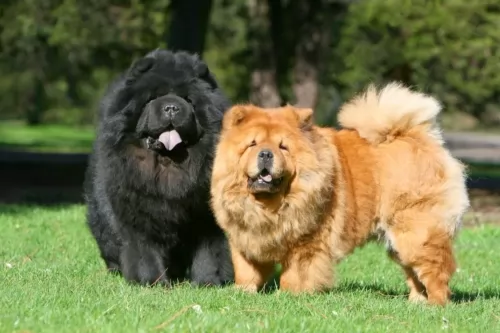 Don’t overfeed a Chow Chow as they are hard workers and big eaters. Feed them at least twice a day.
Don’t overfeed a Chow Chow as they are hard workers and big eaters. Feed them at least twice a day.
This eye disease can lead to blindness if not checked and treated.
These can be removed from an adolescent puppy.
Again, the Chow is susceptible to cancer.
Can lead to heart or kidney problems if left untreated.
Keep a close eye on your Chow Chow skin.
The Chow Chow was developed as working dog, but today’s version is more laid back and doesn’t need excessive exercise. Daily walks will suffice. They live very happily in the city if walked regularly. They are not really a competitive breed outside of obedience and confirmation. They are seldom seen in sports like agility or frisbee.
 The Dutch Smoushond is basically an easy care breed, and it won’t do to try and tame the coat as the dog has a naturally unkempt look.
The Dutch Smoushond is basically an easy care breed, and it won’t do to try and tame the coat as the dog has a naturally unkempt look.
You can brush him twice a week to keep the coat free of matting and to remove loose hairs. The Dutch Smoushond may require the hair being plucked and a professional groomer can do this.
At the same time, the groomer can remove excess hair from the ears and also clean your dog’s teeth. This is of critical importance as bad teeth can lead to a host of health problems.
Get into the habit of brushing your pet’s teeth 2 or 3 times a week, making use of special pet approved toothbrush and toothpaste.